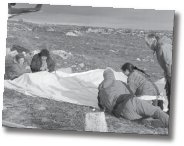When your group completes your interviews, you will feel a sense of satisfaction. You
will be proud of your important work – preserving the valuable knowledge of Elders
before it is too late. But you may not be aware of the long-term impact of your work.
Your efforts will have influence well beyond your own time and place. The recordings
you have created will be a valuable resource far into the future and to people from
other communities, regions and even other countries.
Your recordings must be carefully preserved for the use of future generations. The
best way to do this is to send the master copies or originals of your recordings to
an archive or museum that can store them in ideal conditions.
Otherwise you need to consult with others in your community and agree on a safe
place to keep your recordings. Get professional advice on storing the recordings.
Always keep a second set of copies of the interviews in another location – in case
of ire, water damage or other problems.
Here are some suggestions for storage of recording
- Make at least two copies of the recording for your group to work with and to
keep in the community before you send the master copies to an archive.
- Store recordings vertically, not stacked on their sides.
- Store recordings away from heat sources such as radiators and electrical
equipment.
- Label all recordings with waterproof colourfast markers.
- Cassette tapes are not the best way to store interviews for the long term.
Cassettes must be rewound regularly. If they are left unplayed, the sound on
one layer of the tape is imprinted on the next layer. This causes an ‘echo’ on
the tape. The tapes must be played at ‘play’ speed once a year to prevent this
problem.
How Will People in Your Community Have Access to Your Interviews?
- When you are finished working with the interviews, store the recordings with
your written summaries of the interviews. You might package them in zip-lock
bags or special library storage bags.
- See if your local library would agree to keep and catalogue the interviews.
They could lend them out to people in the community in the same way that
they lend books and other resources.
- If the library in your community is not able to keep the interviews, you may
be able to find another group such as an Elders’ group or the Community
Learning Centre to look after the recordings. If no group is able to safely store
your recordings right now, it may be best just to keep them in a safe place
until a community group is ready to act as an oral history lending library.
Source for Plastic Library Bags
Bro-dart
109 Roy Blvd., Braneida Industrial Park
Brantford, Ontario N3R 7K1
Telephone: 519-759-4350

